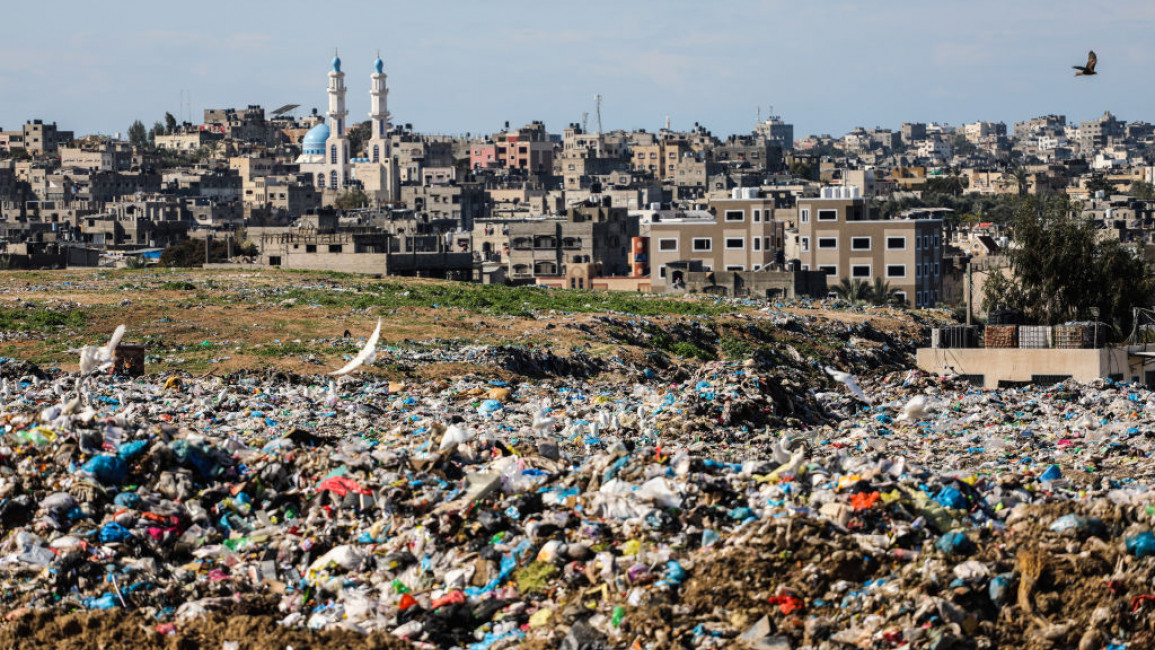Palestinians in Gaza have health threatened as old batteries pile up
At a landfill in southern Gaza, mounds of discarded batteries pile up, rusting cells that pose a growing health risk to Palestinians in the enclave.
Batteries are an essential power source in Gaza, where public electricity supply is sparse and infrastructure has decayed since an illegal Israeli blockade of the enclave began in 2007, the year Hamas Islamists seized control.
Human rights groups have slammed the siege as form of collective punishment that causes suffering to civilians.
"The batteries have been piling up for 15 years," said Ibrahim Baraka, who works at the 2,000 square metre (half an acre) landfill in Khan Yunis, where residents of surrounding houses can peer in to see piles of lead and mercury waste accumulating daily.
Gaza, home to 2.3 million Palestinians, has only one power plant that runs on diesel. Fuel deliveries are unreliable, largely due to the blockade. The plant was also bombed by Israeli fighter jets during a 2006 escalation on Gaza. Israel considered this escalation part of its efforts to combat Hamas.
Mohamed Masleh, director of resources at Gaza's Environment Ministry, estimated that there are 25,000 tonnes of used batteries in Gaza that need to be recycled.
Most are at sites not suited for storing dangerous materials.
A dangerous 'farce'
Battery collection is also a source of income for the impoverished territory, where unemployment rates hover around 50 percent.
On a crisp morning, Zakaria Abu Sultan meandered his horse-drawn cart through the streets of Gaza City, shouting his mission through a loudspeaker.
"Anyone with damaged batteries to sell?" he called out.
"I've been wandering since dawn to buy damaged batteries. I buy them at best for 50 shekels ($15), and sell them to the scrap dealer for 70 shekels," he told AFP.
Typically, damaged cells are taken to landfills, like the one in Khan Yunis where Baraka works, which dismantle them for materials like plastic that are then sold to factories.
Ahmed Hillis, director of Gaza's National Institute for Environment and Development, said that while he understood there was profit in discarded batteries, the trade was extremely dangerous.
The iconic Samir Mansour bookshop in Gaza, which was destroyed in an Israeli airstrike last year, reopened on Thursdayhttps://t.co/XYWXeOK8JI
— The New Arab (@The_NewArab) February 19, 2022
"Tonnes of batteries are accumulating in dumps," he said.
"Batteries are found among people and on animal carts, children are carrying them around," he told AFP.
"Sometimes we find a father and son trying to open them up with a screwdriver. It is a farce and chaos," he added.
Israel used to play a role in managing toxic materials from Gaza, but that stopped with the Hamas takeover in 2007.
Hamas is considered a terrorist organisation by much of the West, and it has no direct contact with Israel.
Last month, COGAT, the Israeli defence ministry body which manages civilian affairs in the Palestinian territories, despite it being a military organisation, said that a second iron shredding machine had become operational at the Kerem Shalom crossing between Israel and Gaza.
The enhanced shredding capacity "will provide a significant increase in the export of iron scrap from the Gaza Strip", COGAT said.
Baraka said that had raised hope for a solution to battery waste, with most agreeing the current situation is not sustainable.
Hillis meanwhile urged Hamas to establish clear rules on handling toxic substances.
He said battery waste was now being managed by people "who do not comply with any rules and have no experience in collecting hazardous materials".



